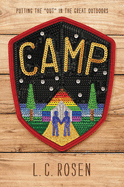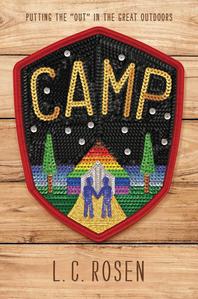
 L.C. Rosen (Jack of Hearts (and other parts)) successfully captures the fleeting feelings of first love and explores identity in his sophomore YA novel, set at a queer summer camp.
L.C. Rosen (Jack of Hearts (and other parts)) successfully captures the fleeting feelings of first love and explores identity in his sophomore YA novel, set at a queer summer camp.
Every summer since 16-year-old Randall came out four years ago, he's attended Camp Outland, "a four-week sleepaway summer camp for LGBTQIA+ teens." Randy and his best friends George and Ashleigh always sign up for the camp musical, but this summer Randy's exchanged his purple wheely bag with cat stickers for a big military surplus bag, cut short his chin-length, wavy hair and requested everyone call him Del. This transformation is all part of "the plan" to make the camp playboy, Hudson, fall in love with him. Hudson is known for serial-dating only guys like himself--"masc" fantasies--but Del is going to be the boy who finally gets Hudson to commit. Del's friends express concern over his choices, but he brushes them off with, "Once we're in love, I'll gradually turn back into Randy."
As Del and Hudson grow closer, Hudson reveals a side of himself that Del is sure he hasn't shared with anyone, a side that includes the struggle with his parents wanting him to be something he's not. But with that comes warning signs that suggest Hudson won't be okay with Del-as-Randy, such as when Hudson pleads with him not to start wearing nail polish. Hudson's feelings make Del question the legitimacy of his new relationship, and doubt if everything he gave up for Hudson was worth it.
Whether it's a camp providing a "who-cares-if-your-wrists-are-loose freedom" or a summer show "unrestrained by gender or sexuality," Camp unashamedly celebrates queerness through Del and his friends' representations of a variety of sexual identities. Rosen explores these identities without ever making them feel like stereotypes or ignoring prejudices in the community, such as how there's always one kid who argues that "being ace and aro isn't queer." This broad inclusion feels organic and is the perfect backdrop for Del's self-discovery. Rosen uses Del's point of view and flashbacks to highlight his internal transformation: suddenly, this nonathletic theater kid is a captain for color wars and friends are asking him for relationship advice. Helping support Del's growth are camp lectures about queer history, like "pre-Stonewall gay liberation movements of the fifties and sixties" and gender-fluid cabaret singers of the '30s and '40s, which encourages Del (and readers) always to be himself, unapologetically. --Lana Barnes, freelance reviewer and proofreader
Shelf Talker: A summer camp for queer teens serves as a backdrop for love, heartbreak and self-acceptance in this hilarious and thoughtful romance.

